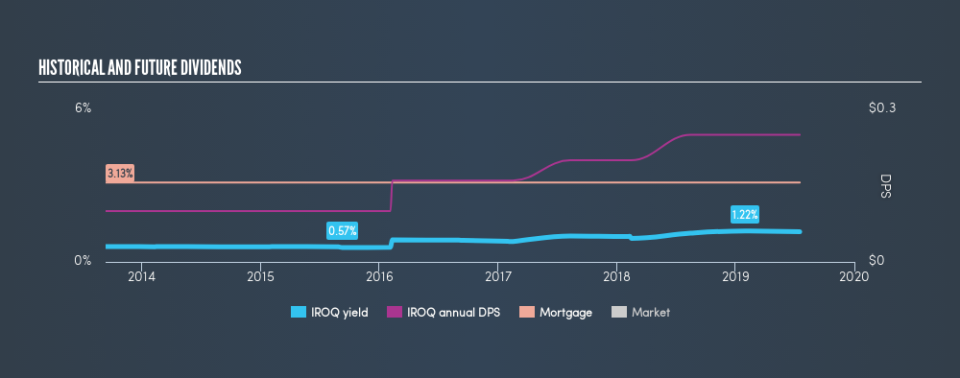IF Bancorp, Inc. (NASDAQ:IROQ) Is Yielding 1.2% - But Is It A Buy?

Want to participate in a short research study? Help shape the future of investing tools and you could win a $250 gift card!
Today we'll take a closer look at IF Bancorp, Inc. (NASDAQ:IROQ) from a dividend investor's perspective. Owning a strong business and reinvesting the dividends is widely seen as an attractive way of growing your wealth. On the other hand, investors have been known to buy a stock because of its yield, and then lose money if the company's dividend doesn't live up to expectations.
With a 1.2% yield and a six-year payment history, investors probably think IF Bancorp looks like a reliable dividend stock. A 1.2% yield is not inspiring, but the longer payment history has some appeal. The company also bought back stock during the year, equivalent to approximately 9.3% of the company's market capitalisation at the time. Some simple research can reduce the risk of buying IF Bancorp for its dividend - read on to learn more.
Click the interactive chart for our full dividend analysis
Payout ratios
Companies (usually) pay dividends out of their earnings. If a company is paying more than it earns, the dividend might have to be cut. So we need to form a view on if a company's dividend is sustainable, relative to its net profit after tax. Looking at the data, we can see that 29% of IF Bancorp's profits were paid out as dividends in the last 12 months. A medium payout ratio strikes a good balance between paying dividends, and keeping enough back to invest in the business. Plus, there is room to increase the payout ratio over time.
Remember, you can always get a snapshot of IF Bancorp's latest financial position, by checking our visualisation of its financial health.
Dividend Volatility
Before buying a stock for its income, we want to see if the dividends have been stable in the past, and if the company has a track record of maintaining its dividend. IF Bancorp has been paying a dividend for the past six years. The company has been paying a stable dividend for a while now, which is great. However we'd prefer to see consistency for a few more years before giving it our full seal of approval. During the past six-year period, the first annual payment was US$0.10 in 2013, compared to US$0.25 last year. This works out to be a compound annual growth rate (CAGR) of approximately 16% a year over that time.
We're not overly excited about the relatively short history of dividend payments, however the dividend is growing at a nice rate and we might take a closer look.
Dividend Growth Potential
The other half of the dividend investing equation is evaluating whether earnings per share (EPS) are growing. Over the long term, dividends need to grow at or above the rate of inflation, in order to maintain the recipient's purchasing power. While there may be fluctuations in the past , IF Bancorp's earnings per share have basically not grown from where they were five years ago. Flat earnings per share are acceptable for a time, but over the long term, the purchasing power of the company's dividends could be eroded by inflation.
Conclusion
When we look at a dividend stock, we need to form a judgement on whether the dividend will grow, if the company is able to maintain it in a wide range of economic circumstances, and if the dividend payout is sustainable. We're glad to see IF Bancorp has a low payout ratio, as this suggests earnings are being reinvested in the business. Earnings per share are down, and to our mind IF Bancorp has not been paying a dividend long enough to demonstrate its resilience across economic cycles. In summary, we're unenthused by IF Bancorp as a dividend stock. It's not that we think it is a bad company; it simply falls short of our criteria in some key areas.
Are management backing themselves to deliver performance? Check their shareholdings in IF Bancorp in our latest insider ownership analysis.
If you are a dividend investor, you might also want to look at our curated list of dividend stocks yielding above 3%.
We aim to bring you long-term focused research analysis driven by fundamental data. Note that our analysis may not factor in the latest price-sensitive company announcements or qualitative material.
If you spot an error that warrants correction, please contact the editor at editorial-team@simplywallst.com. This article by Simply Wall St is general in nature. It does not constitute a recommendation to buy or sell any stock, and does not take account of your objectives, or your financial situation. Simply Wall St has no position in the stocks mentioned. Thank you for reading.

